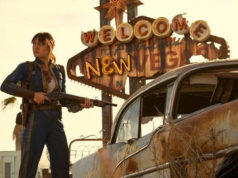As is the case most Christmases, this week has tons of movies dropping into the multiplexes for the holiday, so I’m publishing a guide to the most notable ones.
You cannot ever relax around Jennifer Lawrence. She’s always bristling with some form of discontent that’s ready to turn outward, and you just have to watch. Her latest film, Joy, reunites her with David O. Russell, who directed her in Silver Linings Playbook and American Hustle. This movie about a real-life divorced mom’s rise to business magnate isn’t on the same level as those other two, but it’s a great showcase for Lawrence.
She portrays Joy Mangano, a spottily employed woman living in New Jersey in the late 1980s with her three kids, her failed Venezuelan lounge singer ex-husband (Édgar Ramírez), her mom (Virginia Madsen) who watches soap operas all day in her bedroom, and her dad (Robert De Niro) who’s been left there by his latest ex-wife. They’re scraping by until Joy, while doing one of many crappy household jobs that the others leave her to do, conceives an idea for a better-designed cleaning implement, the Miracle Mop. The film is narrated by one of the few people who never loses faith in Joy, her grandmother (Diane Ladd).
Russell strains to find mythic significance in the undeniably inspiring story of this woman who succeeds despite bad advice and ingratitude from her family. He winds up throwing all sorts of stuff at the wall, and I’ll be damned if I can tell you what he’s doing, including scenes from the fake TV soap (played by soap actors like Susan Lucci and Donna Mills) or the musical number with Joy and her husband standing on a theater stage with fake snow and singing “Something Stupid.”
The acting repeatedly bails out the movie’s missteps. Bradley Cooper portrays the head of the fledgling QVC network where Joy goes to sell her mop, and he gets a bravura sotto voce extended monologue during a broadcast where he points out to Joy how his pitchwomen (including Joan Rivers, who’s played by her daughter Melissa Rivers) do what they do. He makes predictions about sales figures that come true in seemingly magical fashion, and he comes close to stealing this film from the star. However, Lawrence won’t be denied, either in a climactic scene in a Dallas hotel room where Joy coolly faces down a competitor (Alexander Cook) trying to hijack her business or in a sequence at QVC when she sells her own product on camera, a gambit that looks headed for disaster until she gets an unexpected lifeline. As she goes backstage after selling out her stock and her unexpected triumph washes over, you’re reminded afresh how great an actress this is.
Back in the late 1980s and early 1990s, gay characters would pop up in movies and it was a victory if they were simply depicted sympathetically rather than as a villain or a butt of jokes. Within just a few years, that wasn’t enough anymore. The movies that those gay characters were in had to be well-made, and they themselves had to be as vividly detailed as straight characters.
I bring this up because we’re still at that first stage when it comes to transgender characters in movies. It won’t last. In a few years, the biopic The Danish Girl is going to look very dated, but right now, there’s still a place for it in a world where most of us cisgender types don’t know much about what it is to feel trapped in a wrongly gendered body. Unfortunately, that says more about us than about this tepid trans drama that expands into Tarrant County this week.
Eddie Redmayne stars as Einar Wegener, one of Denmark’s most promising landscape painters in the 1920s. His career and his six-year marriage to his artist wife Gerda (Alicia Vikander) are going great, but something’s missing in his life that he can’t name until he and Gerda decide he should attend a society party disguised as a woman and calling himself “Lili Elbe,” Einar’s cousin. What’s supposed to be a prank makes him realize his destiny of becoming Lili and brave the dangers of 1920s medicine.
You can quarrel with the casting of the cisgender Redmayne as Lili or the myriad fudging of the historical facts that go on here, including the fact that Wegener seems to have been an intersex person to begin with. (The film is based on David Ebershoff’s fictionalized novel about Lili Elbe.) However, I’m here to report on the movie’s shortcomings as a movie, and there’s no shortage of those. This is easily the weakest outing by director Tom Hooper (The King’s Speech, Les Misérables). He turns the story into a shapeless lump, and someone needs to tell his production designers that not everybody in the past lived in places with gray-green walls. Lili is remembered for the journal she kept as she prepared to undergo gender-reassignment surgery that was still in the experimental stage at the time, but the movie never gives us a clue as to her inner life. Perversely, the movie makes Gerda into the more complex character by framing this as a love story, with Gerda standing loyally by Lili as she transitions.
We can wait for better movies about trans people, but some are available right now, like Xavier Dolan’s explosive 2013 drama Laurence Anyways and Sean Baker’s raucous comedy Tangerine from earlier this year. That’s not even mentioning what’s been done on TV. The Danish Girl is watered down for a mainstream audience, and the result is weak stuff.
I’m not as big a fan of The Big Short as some of my fellow critics are, but it does manage to be a fun movie about a subject that’s not fun, the 2008 housing crisis and recession. Financially, this thing doesn’t cover much that Charles Ferguson’s Oscar-winning documentary Inside Job didn’t. Unlike that movie, though, this one illustrates synthetic collateralized debt obligations with Selena Gomez and University of Chicago economics professor Richard Thaler talking to the camera while playing blackjack in a busy casino. A device like that can reach an audience that won’t necessarily be pulled in by a documentary.
Based loosely on Michael Lewis’ excellent nonfiction account of the meltdown, the movie begins in 2005 when San Jose-based money manager Michael Burry (Christian Bale) detects a big bubble in the housing market and decides to bet $1.3 billion of his investment firm’s money on its collapse. While Wall Street writes him off as insane — he’s a socially inept guy who blasts heavy metal music in his office and works in shorts and bare feet — a few people think he’s right, like Mark Baum (Steve Carell), a perpetually angry hedge-fund manager with his own shop inside Merrill Lynch. Their stories are narrated by a smarmy, narcissistic Wall Street investment banker (Ryan Gosling), who personally makes $47 million off the chaos and turns to the camera to say, “I can feel you judging me. But hey, I never said I was the hero of this story.”
In charge of all the hijinks is Adam McKay, known as Will Ferrell’s collaborator on the Anchorman movies. Thankfully, McKay does not make the mistake of abandoning his comic instincts here. Besides celebrities explaining financial concepts in layman’s terms (Margot Robbie and Anthony Bourdain get in on the act, too), we also get smart-ass asides by minor characters and pieces of explanatory text — when someone mentions a document called an ISDA, we’re flashed, “Trying to be a high-stakes investor without an ISDA is like trying to win the Indy 500 while riding a llama.” Setting extended portions of the movie in Miami, Las Vegas, and Boulder also helps break this Wall Street story out of a New York bubble. It all works to illuminate the stupidity and incestuous relationships among the funds, the banks, the ratings agencies, the regulators, and the politicians.
The lightness and momentum here eluded other movies about the Great Recession like 99 Homes and even the dexterous Margin Call. Where McKay falls short is depicting the real economic pain and suffering that the downturn brought to poor people. He makes a stab at it, but the job proves to be too big for him. He does, however, conjure an unexpectedly moving scene when Mark, a man who makes his money by believing the worst about people, learns that the system is more crooked than even he knows. When that happens, he goes to his wife (Marisa Tomei) and breaks down, coming clean about his brother’s suicide, the one subject he would never discuss with anyone. This bit of soul shines brightly amid this movie’s amoral soullessness and helps make The Big Short a powerful comment on this big issue.
[box_info]Joy
Starring Jennifer Lawrence. Written and directed by David O. Russell. Rated PG-13.
The Danish Girl
Starring Eddie Redmayne and Alicia Vikander. Directed by Tom Hooper. Written by Lucinda Coxon, based on David Ebershoff’s novel. Rated R.
The Big Short
Starring Christian Bale, Steve Carell, and Ryan Gosling. Directed by Adam McKay. Written by Adam McKay and Charles Randolph, based on Michael Lewis’ book. Rated R.[/box_info]












